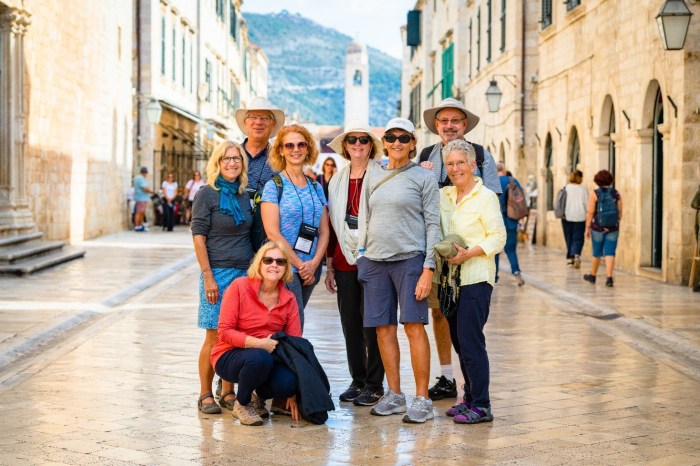Hospitality Travel & Tourism Past, Present & Future
Hospitality travel and tourism is a dynamic industry, constantly evolving to meet the changing needs and desires of travelers. From ancient inns to modern resorts, the experience has transformed dramatically. This journey explores the rich history of hospitality, examines current trends, and forecasts the future of this exciting sector.
The evolution of hospitality, from simple accommodations to luxurious experiences, is influenced by cultural nuances and technological advancements. Different cultures offer unique hospitality models, each with its own set of traditions and service styles. The impact of tourism on local communities, and the need for responsible travel, are also crucial elements of this exploration.
The Evolution of Hospitality Experiences

Source: com.au
Hospitality, a fundamental human interaction, has evolved dramatically over millennia. From simple acts of sharing resources in ancient societies to the sophisticated, technology-driven experiences of today, the evolution reflects societal progress, cultural exchange, and changing guest expectations. This journey showcases not only the progression of services but also the adaptation of businesses to cater to diverse needs and preferences.
The evolution of hospitality is a continuous process of innovation and adaptation, driven by both external factors like technological advancements and internal factors like the need to enhance guest experiences and operational efficiency. This evolution is evident in the various hospitality models across cultures, each with its unique approach to service and guest satisfaction. Understanding these historical and cultural nuances is critical for comprehending the present and future of the hospitality industry.
Timeline of Hospitality Services
The progression of hospitality services reflects evolving societal norms and technological advancements. From ancient times to the present day, a continuous refinement of services has shaped the modern hospitality industry.
- Ancient Civilizations (Pre-1500s): Hospitality in ancient civilizations often revolved around sharing resources and basic accommodations. Hospitality was a vital aspect of social life, signifying respect and generosity. Early examples include the hospitality practices of ancient Greece and Rome, where travelers were welcomed and provided necessities like food and shelter.
- Medieval Era (1500s-1800s): The emergence of inns and hostels marked a shift towards organized lodging services. These establishments catered to travelers and merchants, providing a more structured and reliable form of accommodation. The development of transportation networks, such as roads and waterways, spurred the growth of these establishments.
- Industrial Revolution (1800s-1900s): The Industrial Revolution brought significant changes to hospitality. The rise of tourism and leisure travel led to the establishment of hotels and resorts, catering to a broader range of needs and preferences. Improvements in sanitation and hygiene standards became crucial as the volume of travelers increased.
- 20th Century (1900s-2000s): The 20th century witnessed an exponential growth in the hospitality sector. The introduction of air travel made travel more accessible, driving demand for hotels and related services. The development of global brands and international chains transformed the hospitality industry. Innovations in technology, such as reservation systems and online booking platforms, further streamlined operations and enhanced the guest experience.
- 21st Century (2000s-Present): The 21st century continues the trend of technological advancement in hospitality. Digital platforms, mobile apps, and personalized experiences are reshaping the guest journey. Emphasis on sustainability, personalized service, and unique cultural experiences is are crucial element of modern hospitality.
Impact of Technological Advancements
Technology has revolutionized the hospitality sector, transforming guest experiences and operational efficiency.
- Online Booking Platforms: These platforms have made it easier for guests to search, compare, and book accommodations, significantly impacting the industry’s distribution channels. Examples like Booking.com and Expedia have dramatically altered how guests interact with hotels.
- Mobile Applications: Mobile apps allow guests to access services, make payments, and receive real-time updates directly on their phones. This has improved convenience and streamlined interactions.
- Data Analytics: Data analytics allows hotels to understand guest preferences and tailor services accordingly, leading to a more personalized experience. Hotels can leverage data to optimize pricing strategies and enhance operational efficiency.
- Automation: Automation, through chatbots and automated check-in/check-out processes, has significantly improved operational efficiency. This contributes to cost reduction and improved service delivery.
Hospitality Models Across Cultures
Different cultures have unique approaches to hospitality, reflected in their traditions, values, and customs. These cultural nuances shape the hospitality experience and provide a distinct element to each model.
- Japanese Hospitality (おもてなし, omotenashi): Japanese hospitality emphasizes respect, attention to detail, and creating a warm and welcoming atmosphere for guests. A key aspect is anticipating needs and providing exceptional service with humility.
- South Asian Hospitality: Hospitality in South Asia often revolves around a strong sense of community and generosity. Guests are frequently welcomed with elaborate feasts and an emphasis on creating a comfortable and inclusive environment.
- European Hospitality: European hospitality varies across countries but often emphasizes efficiency, professionalism, and a focus on meeting guest expectations. There’s a strong emphasis on providing high-quality services within a structured framework.
Comparison of Hospitality Service Styles
Different types of hospitality establishments employ varying service styles and approaches.
| Establishment Type | Service Style | Guest Experience Focus |
|---|---|---|
| Luxury Hotels | Highly personalized, attentive, and anticipatory service | Exquisite comfort, exclusivity, and exceptional attention to detail |
| Budget-Friendly Hostels | Friendly, social, and collaborative service | Affordability, social interaction, and a sense of community |
| Resorts | Relaxed, recreational, and amenity-driven service | Relaxation, leisure, and access to diverse activities and amenities |
Tourism Trends and Impacts

The hospitality sector is experiencing dynamic shifts driven by evolving global tourism trends. Understanding these trends and their impacts on destinations, local communities, and the environment is crucial for developing sustainable and resilient tourism strategies. This section examines key tourism trends and their implications, highlighting the importance of responsible travel practices.
The tourism industry is undergoing significant transformations, driven by factors like sustainability concerns, technological advancements, and changing traveler preferences. This evolution necessitates a proactive approach to managing tourism’s impacts effectively, balancing economic benefits with environmental protection and social well-being for local communities.
Significant Global Tourism Trends
Several prominent global trends are reshaping the hospitality sector. Sustainable tourism, driven by environmental consciousness and ethical considerations, is gaining traction. Digitalization, encompassing online booking platforms, mobile applications, and social media engagement, is transforming how tourists plan and experience travel. Furthermore, the rise of remote work is creating opportunities for extended stays and a new type of tourism focused on flexibility and work-life balance.
Economic Consequences of Tourism
Tourism generates substantial economic benefits, including job creation, increased revenue for local businesses, and infrastructure development. However, uneven distribution of benefits and potential inflationary pressures can emerge in destinations with high tourist influx. The sector’s economic impact varies depending on the destination’s characteristics, local regulations, and the specific type of tourism practiced. Tourism’s role in driving local economies can be significantly positive, providing crucial income streams and opportunities for growth, but it needs careful management to ensure equitable distribution of resources and opportunities.
Social Consequences of Tourism
Tourism’s social impacts are multifaceted. It can foster cultural exchange and understanding between tourists and local communities. However, issues like cultural commodification, the displacement of residents, and the erosion of traditional practices can also arise. Careful planning and community engagement are crucial to minimize negative social impacts and maximize positive interactions. A key element is empowering local communities to manage tourism’s effects, allowing them to benefit from the industry while preserving their traditions and cultural identity.
Environmental Consequences of Tourism
Tourism’s environmental footprint can be significant, impacting air and water quality, biodiversity, and natural resources. Increased waste generation, carbon emissions, and over-consumption of natural resources are potential negative consequences. Tourism destinations need to implement strategies to minimize their environmental impact, promoting environmentally friendly practices throughout the value chain. A crucial aspect is the adoption of sustainable practices by all stakeholders, from hotels and tour operators to travelers themselves.
Role of Responsible Travel
Responsible travel practices are vital for mitigating negative impacts and promoting sustainability. Educating tourists about environmental and social issues, encouraging them to support local businesses, and promoting ethical and sustainable practices are important steps. Encouraging tourists to consider the environmental and social implications of their travel choices is critical. This includes choosing accommodations and activities that prioritize sustainability, respect local customs, and minimize waste.
Sustainable Tourism Practices in Hospitality
Sustainable tourism practices are crucial for balancing economic benefits with environmental protection and social well-being. These practices are vital for creating a positive impact for the environment and communities involved in tourism.
| Sustainable Tourism Practice | Description |
|---|---|
| Energy Conservation | Implementing measures like using energy-efficient appliances, optimizing lighting systems, and promoting renewable energy sources. |
| Waste Reduction | Minimizing waste generation through strategies like recycling programs, composting initiatives, and reducing single-use plastics. |
| Water Conservation | Implementing water-efficient fixtures and landscaping, promoting water-saving techniques, and managing water resources responsibly. |
| Community Engagement | Partnering with local communities to support their economic development, preserving cultural heritage, and fostering mutual understanding. |
| Sustainable Procurement | Prioritizing locally sourced products and services to support local economies and reduce transportation emissions. |
The Future of Hospitality, Travel, and Tourism

Source: absoluteinternship.com
The hospitality industry is poised for significant transformation in the coming years. Advancements in technology, evolving consumer preferences, and global events will reshape the guest experience, driving innovation and demanding adaptation. This evolution necessitates a forward-thinking approach to personalization and technological integration.
Emerging Trends in Hospitality
The future of hospitality will be shaped by a confluence of factors, including technological advancements, evolving consumer expectations, and global events. These trends will impact everything from online booking to in-room experiences, demanding proactive responses from hospitality providers. For example, the rise of remote work has created a demand for extended-stay accommodations with flexible workspaces, impacting hotel design and services.
Personalization in Guest Experiences
Personalization is no longer a desirable feature; it’s a necessity in the future of hospitality. Guests expect tailored experiences that meet their specific needs and preferences. This includes anticipating their needs before they are articulated, offering curated recommendations based on past interactions, and providing customized services to enhance their stay. For instance, anticipating a guest’s dietary restrictions and offering a personalized menu option or pre-arranging a specific type of activity are examples of personalized service.
Technological Integration in the Guest Journey
Technology will play a pivotal role in streamlining the guest journey and enhancing the overall experience. From online booking and mobile check-in to personalized recommendations and in-room controls, technology will be interwoven into every aspect of the guest’s stay. A seamless transition between online and in-person interactions is critical.
Table: Technologies Enhancing Guest Experience, Hospitality, travel, and tourism
| Technology | Description | Impact on Guest Experience |
|---|---|---|
| AI-powered Chatbots | Interactive chatbots can answer guest queries, provide instant support, and offer personalized recommendations in real-time. | Reduces wait times, provides immediate assistance, and offers a more personalized experience. |
| Virtual Reality (VR) Tours | VR tours allow potential guests to virtually explore hotel amenities, rooms, and surroundings before booking. | Improves decision-making, increases confidence in booking, and reduces uncertainty. |
| Smart Room Controls | Smart room controls enable guests to adjust lighting, temperature, and other amenities via a mobile device or touch screen. | Enhances convenience and control, and reduces the need for staff intervention. |
| Personalized Recommendations | Algorithms can analyze guest preferences and past interactions to offer customized recommendations for dining, activities, and local attractions. | Improves the guest experience by anticipating and fulfilling needs. |
| Biometric Check-in | Biometric systems allow for faster and more secure check-in and check-out procedures. | Streamlines the check-in/check-out process, enhances security, and improves efficiency. |
Final Wrap-Up

In conclusion, hospital,ty tra,vel and tourism are a multifaceted industry that has profoundly shaped global interactions. The sector’s future hinges on its ability to adapt to emerging trends, embrace sustainable practices, and personalize the guest experience. By understanding the past, recognizing present trends, and anticipating future developments, the industry can create a more rewarding and responsible experience for both travelers and destinations.





